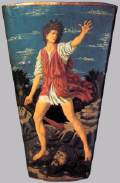Remembering Jonathan
I am reading David's "Song of the Bow" where he mourns Saul and his dear friend Jonathan. This man Jonathan is the best example of true friendship in the Bible (apart from Christ Himself).
Jonathan represents selfless, disinterested friendship--and there isn't much of that in the Bible (though Ruth and Naomi come to mind). There are plenty of examples of false or failing friends. Laban, Judas Iscariot, Amnon's friend Jonadab, Job's friends. If we are honest, we will all admit it is hard to overcome the Adamic nature that wants only our good, and cares very little about the good of others. Jonathan is a true hero because he conquers that selfishness in himself. The Bible says Jonathan loved David "as his own soul." Is that not what the second greatest commandment is...to love our neighbor as ourselves? Maybe this is why Jonathan stands out in Bible history as a sterling example, as a picture of Christ, even.
Let's face it, most of us feel a little twinge of jealousy when we see someone excell in our own field. Yet that is what Jonathan saw when he watched David fight Goliath. Jonathan's reaction was, surprisingly, genuine delight! He was glad to see someone of enough pluck to fight God's battles. How different this was from David's brothers' jealousy and suspicion.
I started thinking of ways that Jonathan is a type of, or at least points to, Christ. Here is a son of a king. He gives up the coat off his back, his bow, and his sword for a poor shepherd boy of low birth (not even the firstborn). He helps David to escape death by Saul. (There's a parallel...Christ Son of a King, giving up his glory for men of low repute, saving them from the wrath of his Father.) He rejoices in the fact that David will be exalted. He is not the least bit jealous. (Christ elevates us to reign with Him. Christ prays that God the Father would love us as He has loved Christ Himself.)
I stand in awe of Jonathan's friendship. I wish I could be as selfless, as eager to rejoice in the successes of others, as eager to give all I have for them. Jonathan was actively and clearly "for" David. He cheered him on, helped him, befriended him. It must have meant a great deal to David that Jonathan came to him secretly when he was fleeing from Saul, to encourage him.
I thought what it would mean to have a friend like Jonathan. Then I remembered that Jonathan's friendship is a picture of Christ's friendship. I do have a friend like Jonathan, only better. That is what Christ is like.
That is what Christ is like, and not an accusing friend like Job's friends. Not a trickster who messes with my emotions and my life like Laban. Not someone who will ultimately betray me like Judas. I have a friend that would give me the coat off his back, who would give me the best weapons of war (His Word, His promises, His Spirit), who rejoices in what I will become (though I am no where near it now), and who comes to me when I am most discouraged to strengthen me. Amazing!





